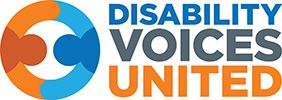Many people with developmental disabilities live in their own home or their family’s home and receive daily support from staff paid by the regional center or IHSS (In-Home Supportive Services). If they live on their own, it is called supported living. These individuals have staff coming into their homes everyday, which reduces the risk of living with many others. But it is very important that the staff also follow physical distancing measures, excellent hygiene, and remain away from other people who are sick.
Tim Jin, a self-advocate with cerebral palsy, has been living on his own with support for many years. He provides this advice for other self-advocates:
“Getting sick with COVID-19 is, of course, a fear, but I’m more afraid that I need to go outside and try to battle with the masses to get whatever to eat. Just in case I’m stuck at home, I have over a month’s worth of canned goods: beans, soup, pasta and sauce, etc. My diet will change if I need to hunker down, but it’s better than starving. Luckily, I don’t take any medication. If I did, I would be stocking up. I overstocked on gloves a few weeks ago. I have lots of water. I will also get some cash or cash cards so that my staff can get what I need.
I may not go to work everyday. I’ve warned my boss that if I start feeling uncomfortable being at work or traveling on the bus, I will take time off. My boss agrees. That means no paycheck, but my health is way too important in this case. I take public transportation and those buses are nasty!
Here is what I am telling my staff:
1. If they are sick, they shouldn’t come in
2. Social distance of 6 feet from others when you are outside
3. Wash hands and don’t touch face
4. Get gas in car and only drive when necessary
5. Have approximately 2 weeks of supplies (food, toilet paper and etc) and ration those items.
6. No cooking extravagant meals using all your protein and no wasting supplies/food.
6. Ration money. Cut off all unnecessary costs and avoid large purchases for the moment.
7. Have a “go bag” with important documents, clothing and other essential items if you need to leave the house in a hurry.
June Isaacson Kailes, Disability Policy Consultant and Associate Director at the Harris Family Center for Disability and Health Policy at Western University of Health Sciences, developed information and check lists that could be very helpful during this Coronavirus crisis. It is called Emergency Preparedness for Personal Assistant Services Users
Disability Rights California urges you to think about the following questions and to find answers in advance to prepare:
Sample Questions to ask a Personal Assistant, Caregiver, or IHSS Worker:
- Will you continue to provide services during a quarantine event?
- Which services will you continue to provide during a quarantine event?
- If you cannot come, who should I call to make sure I can receive services and am still safe?
Sample Questions to ask an agency providing caregiving services:
- Do you have a plan for how you will provide services during a quarantine event?
- Do you have a plan for how to keep your clients safe from illness?
- If you are unable to provide services during a quarantine event, what resources do you have to ensure that I continue to receive the support that I need?
Questions for your health insurance company or Medi-Cal:
- Who do I call for assistance with an urgent illness that does not require a 911 call?
- What fees and costs are you waiving during this time?
- What equipment can I access through my health plan to keep me safe? (such as masks, etc.)
- What kinds of remote services are you offering right now? (for example, are health plans offering expanded phone options, video appointments, etc.?)
- What do I need to have my medications or other medical equipment delivered to my home?
- If I rely on a caregiver and that person is unavailable, can I access emergency equipment or in-home care as part of my health coverage?
General questions:
- Are you signed up for emergency warnings in your county? Do you know how to do that?
- Do you know which phone numbers to call if you feel sick?
- Have you identified people in the community who may provide you with support if you need it? Do you know their contact information?
